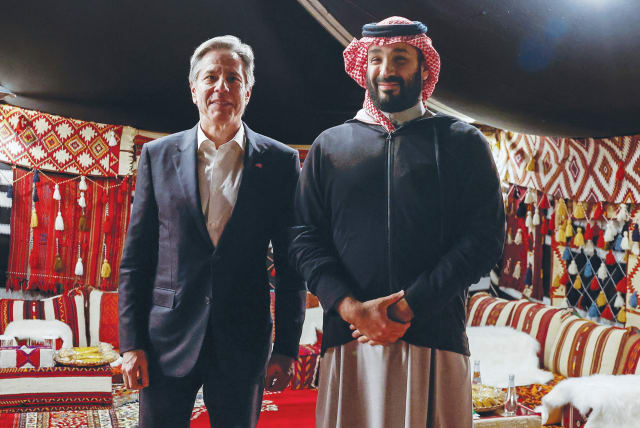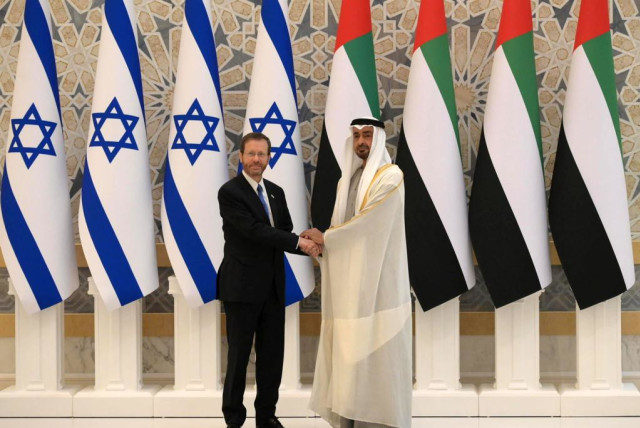Even amid the war with Hamas, Israel isn't alone in the Middle East - opinion

The war has returned this issue to the top of the agenda, and paradoxically, it offers an opportunity for a solution that will strengthen Israel’s position in the Middle East.
Two former Lebanese politicians, Fouad Siniora, who served as a member of parliament and prime minister, and Basem Shabb, who was a member of parliament – published an article in The Washington Post with the headline: “The Arab world is extending a hand to Israel. Will it reciprocate?”
It is highly unusual for two veteran politicians (a Muslim and a Christian), particularly from Lebanon, and particularly during a war, to call on Israel to work towards a political solution on the basis of “two states for two peoples.” They argue that the conflict, at heart, is not Arab-Israeli but Israeli-Palestinian, and in particular, between Israel and Hamas in Gaza.
In their sober analysis, they explain that Iran and its proxies pose a similar or even greater danger to Arab states than to Israel, and that “Israelis and Arabs are on the same page as far as the Iranian nuclear program is concerned.” They add that the Houthis are a bigger threat to Saudi Arabia than to Israel, as are the Shi’ite militias in Iraq to the Iraqi state. They conclude that “the best antidote to Iranian expansionism is a two-state solution with the Palestinians.”
Hamas war has not changed geopolitical divisions and alliances in the Middle East
Three months after the October 7 massacre, it is evident that the divisions and alliances in the Middle East have not changed dramatically. On one side are Iran and its allies – Hezbollah, Hamas, the Houthis, and the Shi’ites in Iraq, all of them non-state actors. Alongside them can be placed Turkey, even though it is not taking part in the military effort but is mainly contributing with anti-Israel propaganda. On the other side are the states that have signed peace treaties and/or normalization agreements with Israel – Egypt, Jordan, the United Arab Emirates, Bahrain, and Morocco, as well as Saudi Arabia.
An analysis of the response of the states in the “moderate” camp reveals that Arab public opinion, which is largely supportive of the Palestinian cause, has not managed to bring about any significant change in the stance held by the leadership. Jordan, for example, recalled its ambassador from Tel Aviv, but this is a step that has previously been taken four times and is thus not unusual. King Abdullah also recently published an article in The Washington Post, calling for an international effort to promote a regional architecture for peace, security, and growth, constructed on an Israeli-Palestinian peace agreement based on the two-state solution.
Egypt did not even recall its ambassador (as it did during the Lebanon War and the Second Intifada). The Egyptian foreign minister declared that “Israel is a neighboring state and we have relations with strong foundations, based on a peace agreement that has proved its ability to meet challenges and overcome them.” Egypt is also playing an important role in negotiating the release of the hostages and in discussions about the “day after,” and it would seem that its interests vis-à-vis Hamas are the same as Israel’s.
The positions taken by the UAE and Bahrain have been particularly courageous, denouncing the massacre by Hamas as “barbaric.”
When President Isaac Herzog met with the ruler of the Emirates, Mohammed bin Zayed Al Nahya, at the UN Climate Change Conference in Dubai in November and with his advisor Anwar Gargash. The latter added that his country had made a “strategic decision” when it signed an agreement with Israel and that despite the difficulties, there is no alternative to a political solution that will end the occupation. President Herzog was also pictured shaking hands with the ruler of Qatar, Emir Tamim bin Hamad Al Thani, at the Conference. Morocco, which broke off diplomatic relations with Israel during the Second Intifada, did not recall its ambassador this time and has continued trade relations, despite much public protest domestically.
Similarly, the Joint Arab and Islamic Summit, held in Saudi Arabia in November, adopted a relatively conciliatory tone, led by the peace and normalization states. While the concluding statement included several harsh denunciations of Israel, it also reconfirmed the commitment to peace as a strategic choice, based on the Arab peace initiative of 2002 and on the two-state solution of Israel alongside Palestine based on the 1967 borders. The peace and normalization states, led by Saudi Arabia, opposed the inclusion of concrete steps against Israel in the concluding statement issued by the summit. While the Saudis have been forced to suspend normalization talks, declarations made by President Joe Biden and by Saudi Crown Prince Mohammed bin Salman (MBS) would seem to indicate that this goal has not been abandoned.
The war has raised many questions about Israel’s place in the Middle East. The main worry was that the process of recognition and integration of Israel in the region, which began with the peace treaty with Egypt (if not before), would be halted or even set back following the war in Gaza. As of now, this fear has not been realized. Even if a full-scale war breaks out between Israel and Hezbollah, it would be unlikely to alter the major fault lines in the Middle East. The main threat lies in a deterioration of the situation in the West Bank, and particularly the Temple Mount.
At the same time, the fact that the peace and normalization agreements have survived the war does not mean that it is possible to continue ignoring and failing to address the Palestinian issue, as the Netanyahu governments have tried to do.
The war has returned this issue to the top of the agenda, and paradoxically, it offers an opportunity for a solution that will strengthen Israel’s position in the Middle East. A combination of normalization with Saudi Arabia and solving the Palestinian issue could prove to be an Archimedean tipping point. Will Israel reciprocate the extended Arab hand? asked the two Lebanese politicians. Time will tell.
The writer teaches in the Department of Islamic and Middle Eastern Studies at the Hebrew University of Jerusalem and is a board member of Mitvim – The Israeli Institute for Regional Foreign Policies.
Jerusalem Post Store
`; document.getElementById("linkPremium").innerHTML = cont; var divWithLink = document.getElementById("premium-link"); if (divWithLink !== null && divWithLink !== 'undefined') { divWithLink.style.border = "solid 1px #cb0f3e"; divWithLink.style.textAlign = "center"; divWithLink.style.marginBottom = "15px"; divWithLink.style.marginTop = "15px"; divWithLink.style.width = "100%"; divWithLink.style.backgroundColor = "#122952"; divWithLink.style.color = "#ffffff"; divWithLink.style.lineHeight = "1.5"; } } (function (v, i) { });

